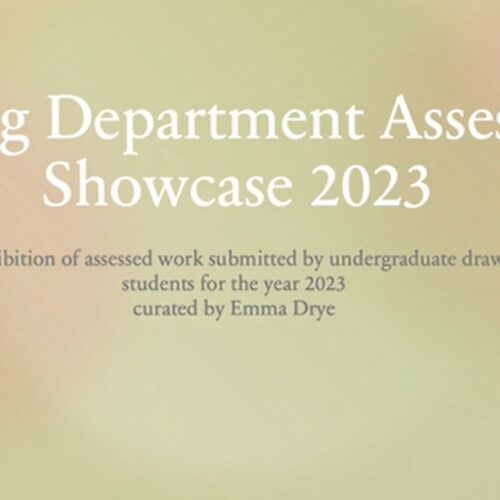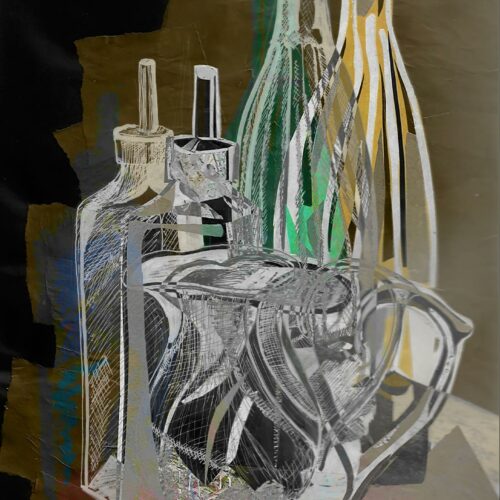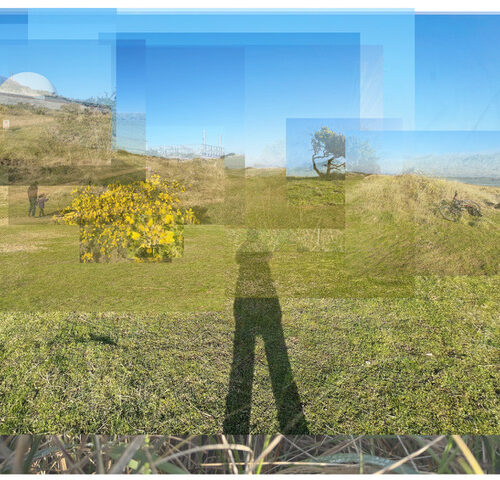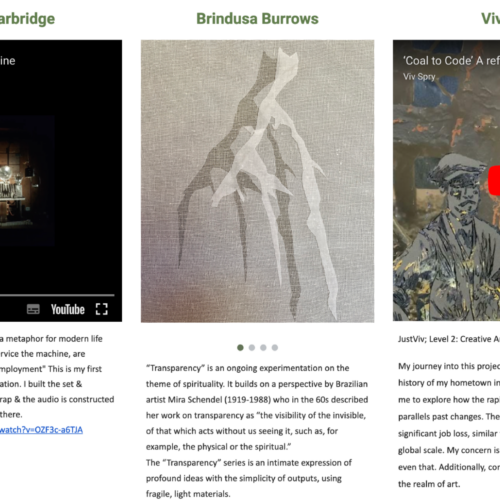
Go figure!
OCA creative writing student Sue Bolton’s 10-minute play ‘Hide and Seek’ has just been performed by a community theatre group in Stonington, Maine, USA. The process of creating the script presented her with the challenges all writers would expect – and some that came as a surprise. Her imaginative approaches to addressing them included playing detective, talking out loud in the ‘voice’ of the characters and drawing a circular diagram of the play’s structure.

Lynn Verhey as Edward and Debbie Weil as Henrietta in Sue Bolton’s ‘Hide and Seek’
In January 2012, the fourth Opera House Arts’ playwriting workshop began. The ‘Opera House’ is located in Stonington, Maine, USA. Maine playwright John Cariani lead the workshop with readings and prompts designed to develop place, character, story, and dialogue. ()
About a year ago, I enrolled on the OCA Writing Skills course. Raised in the UK, I have lived in the USA sixteen years. I face a writing challenge – how do I balance UK life with USA life? My vocabulary reflects my heritage, but is also Americanized. The cultural norms for humour are different and don’t always translate well eg sarcasm. How to address these issues? I am working it out – figuring it out!
‘Hide and Seek’ is a 10-minute play; a comedy addressing the discovery of a family secret. It began as a blank page and lots of ideas needing organization and development. After the workshop I wrote my first draft.
I had ideas about characters, ‘loosely’ based on people with certain attributes. To develop them I played detective. I listed questions that anyone might ask about someone they don’t know well. This produced new information and details I hadn’t realized I already knew. I went for walks and talked like the characters to develop them.
The structure of a play is like music; maybe for you it’s different. It begins by establishing the status quo, gradually building a crescendo of tension and conflict, usually initiated by the protagonist, until the climax. A decrescendo follows with the resolution and conclusion.
There were issues and events I wanted in the story. I find it helpful to draw diagrams – a visual outline. I draw a circle representing the whole play, then place significant events at sequential points. I can then see when things happen relative to the structure.
Writing dialogue is an amazing technique. It includes interruptions, silences, repetitions, stammers, talking over someone and variable speech rates. One exercise had two people reading an article quietly. They were asked to comment whilst reading. It illustrated that two people can be in the same conversation, but thinking completely different things.
Stage directions can help to clarify, or add non-verbal detail. Many directors and actors ignore them. We were advised to minimize them, but include them where we felt strongly.
I found revising ‘little and often’ was productive. I worked daily on making the dialogue as realistic as possible. I concentrated on showing, not telling, the story. However, one could revise forever, which is why a performance is good!
It is easy to get too close to your work. You live with the play until it is performed and afterwards, so it is good to take breaks. This is when readings help.
My first draft was presented at a reading with the other playwrights and directors. I had a ‘secret’ in the play, but it wasn’t explicit and I had not decided whether or not to reveal it. The reading helped me realize that my story was too complex and that I would reveal the secret when I knew what it was myself!
How far is it reasonable for people to go when commenting or suggesting changes to your work? In a writing group you get to listen; hear what your play sounds like. You get valuable feedback about things you are unsure of or haven’t thought of. One key to a successful experience is listening as objectively as possible; striking a balance between taking input and not compromising the integrity of your work.
I made further revisions including changing the title. A phone conference was scheduled; a detailed discussion of the current state of the play. Afterwards, I made final changes and submitted the play for casting.
I was asked for suggestions for actors, understanding that the final decision lay with the director. I attended the first couple rehearsals. This gave the director and the actors the opportunity to ask any questions. Some minor changes in dialogue were made.
Then it was time for me to step away; to let the director and the actors interpret the play. This can be difficult especially the first time, but necessary for everyone to do their job.
There will inevitably be some mismatch between how you conceived of the play and how it translates to the stage; some of it you may prefer some you may not. Next time you see your play will be opening night.
Excitement! Wracked nerves! Complete exposure in a theater full of friends and strangers!
There it is – your hard work – alive on stage!!






Hi Sue,
Congratulations. I know that “naked” feeling when you expose your work for scrutiny. The excitement preceding it, the ecstasy and the blindness in the limelight and the come down, too. Something to be repeated many many times!
Keep writing.
Csilla
Hi Csilla,
Thanks! Yes, not for the faint hearted!
This is an encouraging process for communicating with other students – thanks again for suggesting it.
Will be in touch soon with some writing,
Sue.
I am interested in the question of how far you can expect readers to go in commenting on your writing. It seems such a delicate line to me, but genuinely keeping the writer and her project at the center is the key element. Seems obvious, but in truth people want to have opinions that are more personal than in service of the project. Liz Lerman’s Critical Response format is a good one to mitigate this tendency. Here’s a link to a basic outline of it: http://unlockingtheclassroom.blogspot.com/2009/06/liz-lermans-critical-response-process.html.
Thanks for responding to the blog post Judith. Your observation about what people want from a reading is an interesting one. I think, especially for inexperienced writers, it is an important learning process to move from the personal to the service of the project – something I am very aware of myself! Thanks for the link – I will check it out.
Sue.
Hi Sue,
It would be great if you could find a video recording of the play and perhaps post it here. If you need editing I might be able to help.
Csilla
Well done Sue! I’m working my way through Narrative and Dialogue right now (hi Csilla!) and just starting to get an idea of the many considerations a writer must make when considering the performance; e.g. keeping to a small budget when starting out, how to quickly depict a new location without lots of scenery needing to be moved around, keeping cast to a minimum etc.
Scripwriting was never really my thing until I studied Writing Skills, which is when it really gripped me. Have you always been fond of the performance side of writing or did you, too, come to it through your studies?
Thanks for the inspiration!
Thank you Paul! It sounds like we are on the same Part of the Writing Skills course.
Budget, scenery and cast numbers are all very relevant when staging community plays. Keeping those things low, simple and straight forward can help to focus the writer on the dialogue. If the play is longer than 10 minutes then these aspects can take on a different perspective.
I have been involved with amateur theater and performance for many years. Having the Opera House here in Stonington is wonderful as they have so many programs which include community members either working on their own or together with Actors Equity members. So, I did come to ‘scriptwriting’ firstly from a performance perspective and then had the opportunity to write my own…and it is kind of gripping!
I’m glad the blog was an inspiration and wish you well with your writing.
Sue.
Congratulations Sue. Was the play videoed? I would love to see it if so.
Thank you Catherine! The play was videoed. I am going through a process at the moment to see if it would be feasible to have it available for viewing. If it is, I will let you know. Are you a Creative Writing student?
Sue.
That would be wonderful if you could Sue. I’m a photography student but very interested in creative writing (did an Ad Ed course a long time ago) and follow some creative writing blogs.
Thanks for sharing your experiences, Sue. As a music student I’m hoping to write a chamber opera for my level 3 composition course. I’ve just attended a weekend about small-scale site-specific opera at the Aberdeen Sound Festival and find the interface between acting, theatre and opera very inspiring. The parallels in the dramatic structure between a play and music are very true – we’ve got lots to learn from each other. I’m about to start writing the libretto for my own chamber opera and may experiment with some of the techniques you tried to make things work dramatically. Congratulations on having your work played!
Best wishes,
Petra
You are welcome Petra and thank you.
The parallels you describe seem very natural to me and I find my musical experience definitely helps conceptually when structuring my writing. I studied music to ‘A’ level at school and have a lot of amateur experience in orchestral, chamber, choral and operatic music.
How exciting to be writing a chamber opera! I wish you the best of luck with your libretto and would be very interested to know if you do try any of the techniques I used and how they go.
Good luck,
Sue.